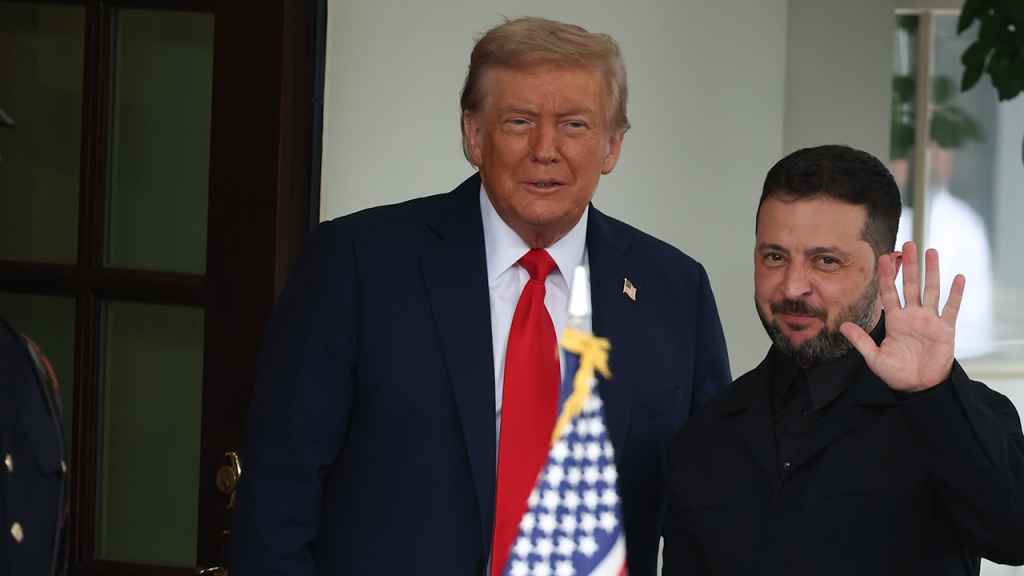Zelenskyy and Trump Forge Productive Dialogue Amid Russian Aggression
Ukrainian President Volodymyr Zelenskyy recently shared details about two consecutive days of “very productive” phone conversations with President Donald Trump, signaling potentially intensified U.S. involvement in the ongoing conflict. During these discussions, the two leaders addressed critical aspects of Ukraine’s defensive position, including strategies to strengthen air defense systems, build resilience, and enhance long-range military capabilities. Zelenskyy specifically noted Trump’s thorough understanding of the situation, remarking that the former U.S. president is “well informed about everything that is happening.” Energy sector cooperation also featured prominently in their talks, though specific details remain undisclosed. The Ukrainian president expressed confidence in their developing relationship, mentioning that both leaders have committed to continuing their dialogue while their respective teams prepare for future collaborations.
These high-level communications come at a particularly devastating moment for Ukrainian civilians. Moscow has escalated its attacks, launching waves of drones and missiles that recently wounded at least 20 people in Kyiv and triggered widespread power outages. The human toll continues to mount, with a child killed in a separate Russian assault in southeastern Ukraine. Russia has also initiated what appears to be its annual pre-winter campaign targeting Ukraine’s power infrastructure, a strategic move designed to maximize civilian suffering during the coldest months of the year. This escalation coincides with Moscow’s expressed “extreme concern” regarding the potential U.S. provision of Tomahawk cruise missiles to Ukrainian forces, indicating Russia’s heightened anxiety about Western military support.
The timing of these conversations reflects a shifting American approach to the conflict under Trump’s leadership. Late last month, Trump made a significant policy adjustment by permitting Ukraine to employ U.S.-supplied weapons for strikes deep within Russian territory. Additionally, the administration is actively considering whether to provide Kyiv with sophisticated Tomahawk cruise missiles, a move that would substantially enhance Ukraine’s long-range strike capabilities. Trump has also publicly committed to supporting Ukraine’s territorial integrity, vowing that the country can reclaim all land seized by Russian forces. These developments represent a notable strengthening of the U.S. position regarding Ukrainian military operations and suggest a more assertive stance toward confronting Russian aggression.
Zelenskyy has drawn hopeful parallels between Trump’s recent diplomatic success in brokering an Israel-Hamas ceasefire and potential progress in Ukraine. In an exclusive interview with Fox News’ “The Sunday Briefing,” the Ukrainian leader expressed optimism that similar diplomatic pressure might yield positive results with Russia. “I think this Israel success… gives signals for us and hope that with such pressure, what President Trump used in Middle East to make peace, and I hope that he will use the same instruments, even more, to pressure [Russian President Vladimir] Putin to stop his war in Ukraine,” Zelenskyy stated. This perspective highlights Zelenskyy’s belief that Trump’s diplomatic approach, which proved effective in another complex international conflict, could potentially be applied successfully to ending Russian hostilities.
The backdrop to these diplomatic developments is an increasingly dire humanitarian situation across Ukraine. As winter approaches, Russian forces have intensified their targeting of essential civilian infrastructure, particularly focusing on the power grid that millions of Ukrainians depend on for heating during the brutally cold winter months. These tactics, which appear deliberately timed to maximize civilian hardship, have become a recognizable pattern in Russia’s war strategy. Each winter since the invasion began, Moscow has executed coordinated strikes against power stations, transmission lines, and heating facilities, creating conditions that disproportionately affect vulnerable populations including the elderly, children, and those with medical needs that require electricity. The international community has repeatedly condemned these tactics as potential violations of humanitarian law due to their indiscriminate impact on non-combatants.
The evolving relationship between Zelenskyy and Trump could represent a pivotal moment in the trajectory of the conflict. Trump’s willingness to engage directly and frequently with the Ukrainian president suggests a level of personal investment that might translate into more robust American support. Meanwhile, Zelenskyy has demonstrated diplomatic flexibility by embracing Trump’s potential role as a peacemaker, drawing explicit connections to his Middle East achievements. As both leaders continue their dialogue and their teams work behind the scenes, the international community watches closely for signs of a breakthrough that could potentially alter the course of this devastating war. The coming weeks may reveal whether this renewed diplomatic channel can produce concrete steps toward de-escalation or whether the conflict will continue to intensify as Russia maintains its aggressive posture and Ukraine, with Western backing, fights to defend its sovereignty and territorial integrity.


